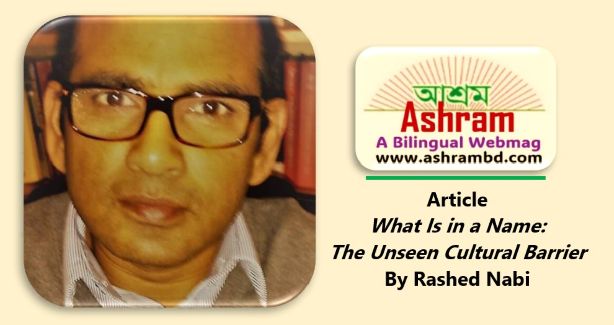What Is in a Name: The Unseen Cultural Barrier

By Rashed Nabi
What’s in a name? That which we call a rose
By any other name would smell as sweet
– Shakespeare
We love our names. We know they were not chosen by us, but by our parents. Still, we cherish them as if they are personal possessions. As we grow, our names become part of who we are. We don’t care what others think of our names. A name may be liked by many but ridiculed by others unfamiliar with its cultural significance. Regardless, we never hesitate to make our names known. We can hide our names only if we can hide ourselves from others or conceal our identity. Our names speak to our identity, if not our personality.
A name can also invoke powerful emotions. There is a story that during the Swaraj movement in India, many Indians, began naming their children Swaraj. It was their deep emotional stance to defy the British colonial rule. Following the novel tradition, a Bengali parent also named his son, Swaraj. Every time someone called out the boy, they literally invoked the dream of Swaraj or self-rule. This irritated British colonial staff when the boy was introduced at public events, but there was nothing in their colonial laws that they could use to punish the parent for taking such a clever anti-colonial stand.
The egregious caste system in the same country, India, has created a naming tradition that separates one group of people from another based on their caste identity. Their surnames tell others who are from the higher caste and who are from the lower. Their surnames can also dictate how they engage in social interactions with one another. Most Hindus, despite their education and radical intellectual orientations, never consider abandoning this tradition. Those familiar with this tradition can easily see the dominance of higher castes in Indian politics, economy and culture.
Unfortunately, even in our secular world, religion plays a key role in naming traditions. In a multicultural society like Canada, a name serves as a marker of multiple identities, reflecting religious affiliations, countries of origin, and ethnic and cultural backgrounds. The moment we hear a name, we reflect on those identifies of the person and make a lot of assumptions about the person. Names originated from the Christian tradition are written and sometimes pronounced differently in the West and elsewhere. Similar variations apply to the names originated from the Muslim tradition, used in the Arab world and many Asian and African countries. On the one hand, it shows the complex relationship between culture, identity, and naming practices. On the other hand, it shows that names can be both personal and political, carrying meanings that extend beyond individual preferences.
Many names have lost their caste-based or occupation-based significance, even in the western world. When we hear the last name Smith, Farmer, or Shoemaker, we don’t associate the person with the occupations that those names originated from the pre-industrial period. Similarly, the name Karmokar, meaning blacksmith, has lost its original significance among Bengalis, as the work of blacksmiths has been taken over by organized workshops. Many other occupation-based names still persist, even though the occupations they originated from have largely disappeared.
Names, which often celebrate cultural diversity, can unfortunately become a source of racism and discrimination, particularly for new immigrants in Canada. They frequently face challenges when others struggle to pronounce their names, often being asked to tolerate mispronunciation with a polite “bear with me.” This expectation of accommodation isn’t typically reciprocated when the situation is reversed, highlighting a power imbalance rooted in colonial history. New immigrants coming from the formerly colonized nations are presumed to have an automatic familiarity with dominant culture’s naming norms.
The discrimination in the job market based on name identity is a well-documented phenomenon. Study after study has shown that candidates with non-Anglo names are less likely to receive a callback from hiring managers, despite being born and educated in Canada. It’s no secret that a Ryan Allen will have a higher chance than a Raihan Ali of getting a call for an interview due to the prejudice and racial bias of the hiring team. The issue extends beyond the job market. As a customer, Raihan Ali may struggle to have his name recognized and pronounced correctly, simply because it doesn't fit the dominant cultural tradition. The burden falls on him to repeat his name multiple times, with others often making little effort to learn or pronounce it accurately. This highlights the systemic nature of the problem, where individuals with non-white or Asian names face an unfair burden in being recognized and valued.
Although we live in a multicultural society, we often find ourselves adhering to rigid social norms reminiscent of a caste system, where interracial marriage can face disapproval. When such marriages do occur, there’s a notable trend: the non-white spouse is more likely to adopt the white spouse’s last name, rather than the other way around. This cultural assimilation extends to naming children, where names like “Ryan” might be preferred over “Raihan due to its familiarity to the dominant culture. Ultimately, the onus falls on non-white individuals to conform to what’s deemed “easier” for the dominant culture, subtly reinforcing existing power dynamics.
When a friend struggles to pronounce our names correctly, we might casually say, “What's in a name?” But when names are used to discriminate, it’s essential to recognize this practice as a systemic barrier and stand up against it.
Rashed Nabi
Ottawa.
-
en-ashram-N/G
-
02-08-2025
-
-